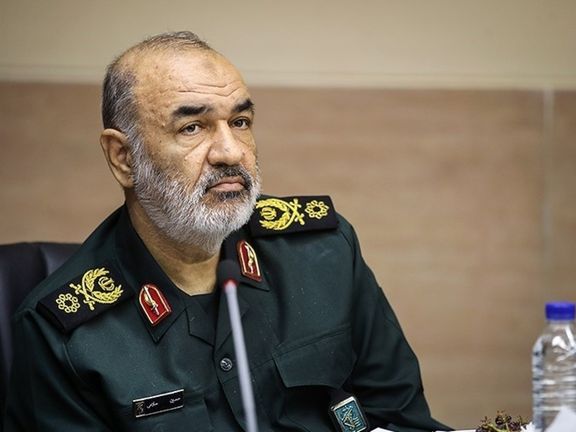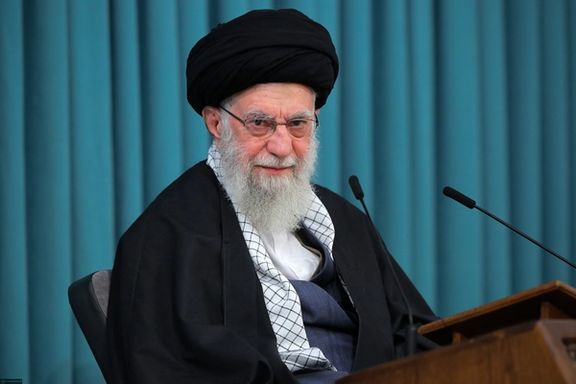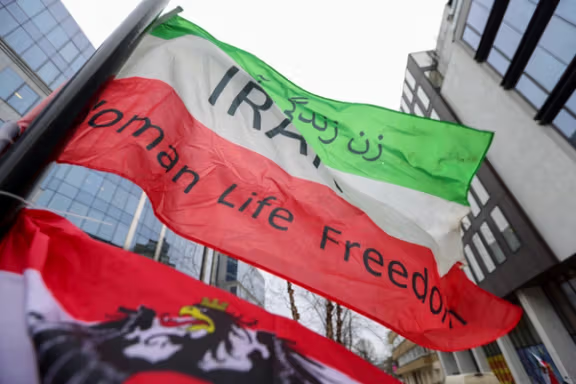Iran's IRGC Commander Calls For Israel's Eradication

Iran's IRGC Chief-Commander Hossein Salami asserts that only the eradication of Israel from the world's political map can guarantee the security of Muslims and Palestinians.

Iran's IRGC Chief-Commander Hossein Salami asserts that only the eradication of Israel from the world's political map can guarantee the security of Muslims and Palestinians.
Salami's Saturday remarks come amidst escalating tensions in the Middle East as the war between Hamas and Israel continues.
"Enemies seek to impose their will upon us, expecting our people to act politically according to their desires… I tell them that in the future war, we will showcase the most glorious political saga as a strong fist," Salami declared, emphasizing Iran's commitment to supporting Palestinian militant groups.
Salami is known for his rhetoric against Israel and the United States, although the clerical regime in Tehran has avoided direct involvement in conflict.
The recent assault on Israel by Hamas, which resulted in the loss of more than 1,000 civilian lives, has further fueled Iran's rhetoric against Israel. However, Iran's threats have not outlined a clear detailed plan of action.
Iran-allied militias have already initiated attacks on US troops' bases in Iraq and Syria, extending the conflict beyond Israeli borders. The Iranian regime openly signaled its support for Hamas, providing financial and arms support, with Iran's ruler Ali Khamenei and President Ebrahim Raisi praising the recent onslaught.
Despite US preference for diplomatic dialogue, President Joe Biden's stance on the conflict with Iran has faced criticism for its perceived leniency. Iran's militias have retaliated against US facilities, resulting in multiple deaths, prompting Biden to authorize strikes on targets associated with Iran's IRGC in Iraq and Syria and Yemen in response to recent provocations.

Over 800 inmates at Urmia Central Prison in northwestern Iran have called for the removal of the prison's chief, citing a rise in suicide incidents attributed to mistreatment.
Reports from human rights sources reveal that prisoners have raised concerns in an open letter over abuse inflicted upon inmates and their families by the prison chief Peyman Khanzadeh and other guards.
The letter notably references the recent suicide of a prisoner who was condemned to amputation of limbs according to Islamic Sharia laws.
Despite calls from international bodies such as the United Nations and rights groups urging the cessation of amputation sentences and their execution in Iran, the issuance and execution of such punishments persist in the Islamic Republic, including whipping, finger amputation, stoning, and amputation of hands and feet.
"Amir Shahbazi, having been pardoned by all his complainants, ended his life through suicide with no prospects of freedom," added the letter.
According to the report, Shahbazi had previously communicated to his family in a letter that both the prison chief and a ward officer were factors leading to his decision to take his own life.
Prisoners further detail the dire conditions within solitary confinement cells describing them as "appalling" and "horrendous." They highlight that numerous inmates in these areas have taken their own lives in recent months, resulting in grieving families receiving the bodies of their loved ones every few months.
Human rights activists and organizations continue to voice concerns over the torture and mistreatment prevalent in Iran's prison system. They emphasize that such cases are particularly severe and widespread in facilities located outside the capital city, Tehran.

Iranian-American dissident activist Masih Alinejad emphasized to Iran International that Western leaders harbor no uncertainty about the necessity of overthrowing the Iranian regime.
"I challenged the foreign ministers of Western countries for not listing Iran's Revolutionary Guard (IRGC) as a terrorist organization after I came to know that the issue of the Islamic Republic and its evil deeds was removed from the agenda of the Munich Security Conference," she remarked in a television interview. Alinejad participated in the conference and spoke with several European politicians.
According to the dissident, she told the representatives of Western governments that “unless you treat [Supreme Leader] Ali Khamenei and the IRGC the same way you treat Vladimir Putin, you cannot even discuss ending the war in Ukraine.”
Though Western countries have no doubt that the Iranian regime is the main instigator of war in the region and has been involved in more than 500 assassinations on their soils, they say in private meetings that in the case of designating the IRGC as a terrorist organization, it may “carry out more terrorist operations,” Alinejad went on to say.
The IRGC was initially established as a custodian of Iran's 1979 revolution's ideological principles. Over time, it has transformed itself into a significant force, gaining control in military, political, and economic aspects within the country. It was banned in the United States in 2019.
Over the past years and particularly, after massive protests in Iran triggered by the death in morality-police custody of Mahsa Amini in 2022, many Iranian political and civil activists have urged the international community to adopt a tougher stance towards the Islamic Republic and designate the IRGC.
In another part of her interview with Iran International, Alinejad stressed that “Westerners want to make sure that there is a functioning opposition in Iran that can hold free elections and prevent any chaos and insecurity after the overthrow of the Islamic Republic.”
The New York-based political activist further added that Iran’s nationwide uprising in 2022 and the October 7 attack on Israel by Tehran’s proxy Hamas have left Western leaders with no doubt regarding the necessity of the overthrow of the regime.
Though everyone knows that the Islamic Republic will collapse, they don’t know who to negotiate with because Iran abounds with multiple viewpoints and the West is worried that Iran may end up in the same political situation as that of Iraq or Syria after the current regime collapses, Alinejad noted.
Referring to the failure of the Iranian opposition groups to work together, she stated: “Not only Westerners, but also the Iranian people are asking how foreign governments can trust an opposition which is disjointed like scattered islands.”
The face-to-face meetings of the opposition forces with Western authorities will be effective in reflecting the voices of the Iranian people, but these meetings won’t be conducive to desired results if it is not proven to the international community that the opposition can hold free elections after the regime collapses, the dissident warned.
Alinjead has been one of the most vocal critics of the Iranian regime. Over the past years, she has been the target of several schemes by Tehran’s agents who planned to kidnap or assassinate her. US law enforcement foiled these conspiracies.
In 2021, US prosecutors indicted four individuals suspected of being Iranian intelligence operatives, alleging their involvement in a plot to abduct Alinejad.
In January 2023, the US also charged three men named Rafat Amirov, Polad Omarov and Khalid Mehdiyev with murder-for-hire and money laundering for their role in the thwarted Tehran-backed plot to assassinate Alinejad.

Narges Mohammadi, Nobel Peace Prize laureate and imprisoned human rights activist, has denounced the upcoming elections in Iran as "theatrical" and "staged managed."
In a statement shared on her social media accounts on Saturday, Mohammadi declared that boycotting government staged elections is a "duty."
"I, along with the people, will aim to declare the Islamic Republic's lack of legitimacy and the oppressive regime's rift with the people by sanctioning the theatrical elections," stated Mohammadi.
“The Islamic Republic, with its ruthless and savage oppression, the massacre of the youth on the streets and the gallows, and the imprisonment and torture of the people, deserves national sanctions and global disgrace,” she added.
Government and independent surveys reveal a lack of public interest in the elections. According to a survey by the Islamic Republic of Iran Broadcasting (IRIB), 52% of people were unaware of the vothing date.
Mohammadi reiterated in her recent statement that transitioning from the dictatorial religious regime is a national demand and the only path for Iran, Iranians, and humanity's survival.
According to another survey, most Iranians plan to boycott the upcoming parliamentary elections, with 75 percent expressing a desire for government overthrow.
Conducted by the Netherlands-based Gamaan institute, the survey gathered data from 58,015 Iranian residents aged 19 and above over an eight-day period from January 31 to February 7. Titled "Iranians' Attitudes Toward the 2024 Elections," it represents a sample from 90% of the country's literate adult population.

Amid expectations of a low turnout in elections on March 1, Iran’s Supreme Leader Ali Khamenei claimed “trusting the people” has been an integral part of the Islamic Republic.
What made the Islamic Republic "stable and progressive" and helped it overcome many "obstacles and conspiracies" was the combination of “trust in the people’s republic and Islam,” Khamenei stated on Saturday.
His remarks come against the backdrop of an unprecedented apathy among Iranians over the parliamentary and the Assembly of Experts elections which are to be held on Friday. Over the past weeks, Iran’s Supreme Leader has time and again made fervent appeals for voter turnout.
The elections are anticipated to witness historically low turnout, reflecting a crisis of legitimacy for the regime, particularly after the brutal crackdown of the nationwide uprising in 2022. Various political groups, including the Reform Front, comprising more than two dozen reformist parties, have declared their refusal to participate in the upcoming elections, citing concerns about its lack of competitiveness and fairness.
In another part of his speech, Khamenei lauded what he called “the staying power of resistance forces” in Gaza, further adding that “the enemies” have given up hope of destroying the Palestinian resistance.
“Axis of resistance” or “resistance forces” are labels the Iranian authorities employ to refer to Tehran’s proxies in the region, such as Hamas, Hezbollah, Hashd al-Shaabi in Iraq and Yemeni Houthis.
Despite Khamenei’s claims, reports from the ground indicate that Israel has annihilated a large part of Hamas’ operational and logistic capabilities in Gaza. According to the Israeli army, more than 10,000 Hamas militants have been killed or incapacitated in the Gaza war since October 7.

A study by the Ministry of Culture and Islamic Guidance reveals a significant decline in adherence to religious values, despite extensive ideological propaganda by the government in Iran.
The confidential study, conducted by the Ministry's Research Center for Culture, Art and Communication and leaked to foreign-based Persian media outlets, highlights that approximately 73 percent of Iranians advocate for the separation of religion from state, indicating an unprecedented demand for a secular government.
Contrary to the 22.5 percent advocating for a religious government, a sharp increase in secularism is evident, with demands for secular governance rising from less than 31 percent in 2015.
The significant change seems to have taken place since large anti-regime protests in 2022 and 2023 when the "Woman, Life, Freedom" movement began, representing the most serious challenge to the Islamic Republic in 45 years.
With participation from over 15,800 Iranians aged 18 and above across all 31 provinces, this is the fourth such study, following similar ones in 2000, 2003, and 2015.
Although the population's departure from the government's ideological values is shocking enough for the government, most of those taking part in the study have reiterated that Iranians are likely to be even less religious in the coming years.

Moreover, nearly 62 percent of participants believe that ideological inquiries should not be part of employment exams, underscoring the societal polarization around religious and ideological matters under the clerical regime.
In one of the most important findings of the study, 85 percent said Iranians have become less religious compared to 5 years ago. Only 7 percent said they have become more religious and around 8 percent said they can see no difference in this regard between now and 5 years ago.
Looking ahead, over 81 percent anticipate a continued decline in religious observance over the next five years, reflecting shifting societal attitudes towards religious practices. Only 9 percent said they are likely to be more religious and around 10 percent said there will be no difference.
Regarding the compulsory hijab, attitudes have shifted markedly since 2015, with a substantial portion expressing tolerance towards women who defy the mandate. Only a minority now support strict enforcement of hijab rules. Around 38 percent said they do not mind if women defy the compulsory hijab, 46 percent said they oppose women who do not wear hijab but will not object to them.
The change since 2015 is significant. Some 10.6 percent had said in 2015 that they do not mind violation of compulsory hijab. Meanwhile, 34.4 percent said compulsory hijab rules should not be imposed on women who do not like it. The figure was 15.7 in 2015. On the other hand, 7.9 percent said they absolutely agree that women must be made to wear hijab whether they like it or not. The figure was 18.6 percent in 2015.
Only 11 percent of those who answered the questionnaire said they always take part in congregational prayers while 45 percent said they had never attended Friday prayers. As opposed to 13 percent who said they always read the holy Koran, 19 percent said they never read it.
The figures show why the Iranian government was reluctant to publish the results of the study although several journalists during the past week called on the government to make it available to the public. The reluctance of the Iranian government underscores its discomfort with the findings, which contradict its narrative of promoting piety. Instead, the data suggests a decline in adherence to religious values under clerical rule.